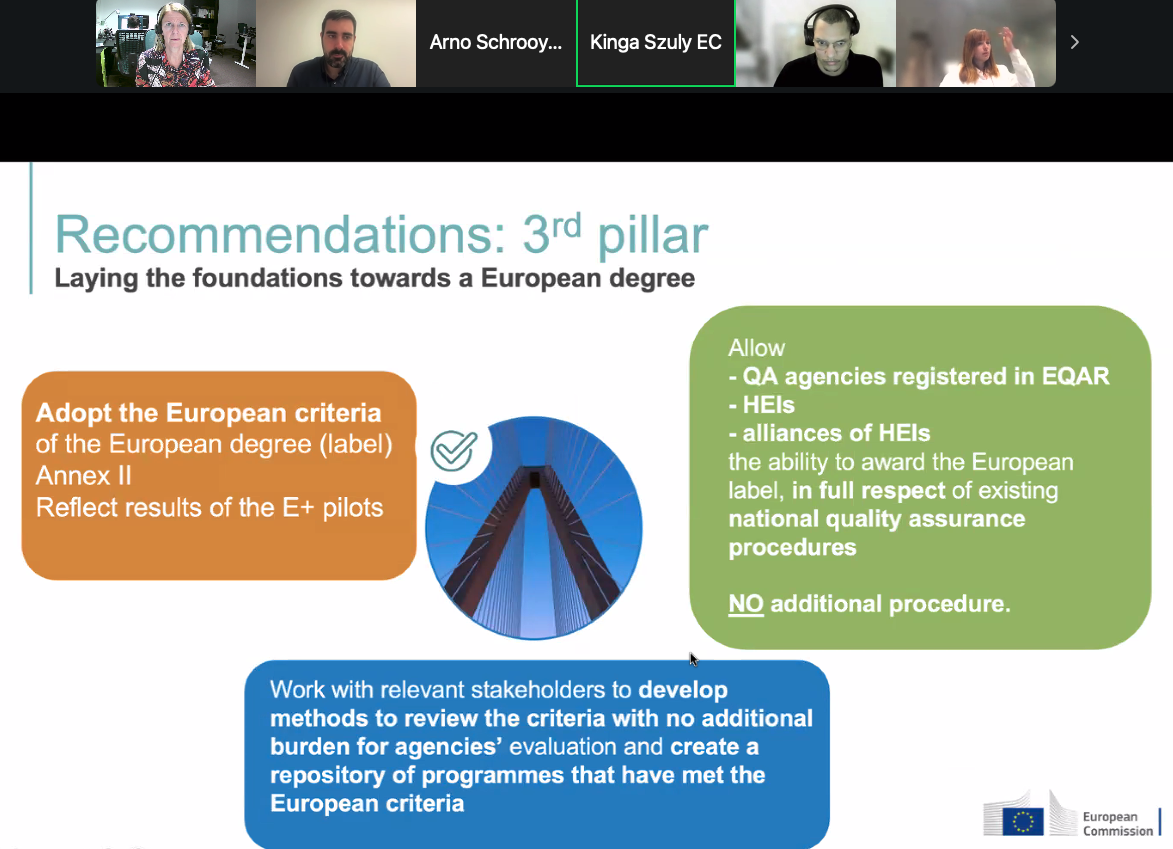
Members’ Dialogue “Shaping the future in an evolving HE landscape”
The 14th edition of the EQAR Members’ Dialogue took place online on 28 and 29 October (afternoons only) with 68 people attending in total, including founding members, a social partner and 28 governmental members. The EQAR Register Committee and Appeals Committee were also represented at the event.
The European Degree package
Topics of the first afternoon centered mainly around the European Degree package and what this entailed for EQAR. The European Commission gave a presentation about the initiative and its policy objectives; increased employability and skills relevance (for students and employers), easier cooperation and more global competitiveness (for universities) and a driver for strategic cooperation and global competitiveness (members states and the EU).
Members reflected on the potential EQAR contributions to a variety of processes:
- Refining the European degree (label) criteria
- Verifying the suitability of QA agencies to authorise programmes and institutions to award a European degree
- Serving as a repository of (information about) joint programmes that award European degrees
- The work of the European degree policy lab (expert group)
The European Approach for Quality Assurance of Joint Programmes
Attention was also paid to EQAR’s contribution to the European Degree package in relation to DEQAR and the European Approach for Quality Assurance of Joint Programmes (EA). The latter session kicked off with a presentation from the European Commission followed by three practical examples (of Sweden, Austria and Una Europa).
- The Austrian example showed that there was a sharp increase in joint programme initiatives after an amendment to the law with regard to the EA in 2021. The European Approach has since then been available to all higher education institutions and the results of quality assurance procedures carried out in accordance with the European Approach are to be recognised in this context, if they have been carried out by a quality assurance agency registered in EQAR. Although there are still some legal and institutional obstacles (duration, grading, number of ECTS), hardly any QA obstacles were mentioned at national level at a recent event with Austrian HEIs participating in the European universities.
- In Sweden, the situation is rather different, with the Swedish national agency (for a number of reasons) unable to act in the transnational European education arena by performing reviews outside Sweden’s borders. They are also unable to acknowledge the results of reviews of Swedish HEIs performed by other quality assurance organisations. This sometimes results in an increased workload for Swedish universities and university colleges. The Swedish Higher Education Authority has proposed to the Ministry of Education to take the initiative to review Swedish regulations and procedures as well as the possibility that Sweden can recognise reviews carried out by other EQAR-registered organisations in accordance with the Bologna Process.
- Una Europa confirmed that, although there are still a number of challenges and restrictions in the implementation, as a joint framework, the European Approach is a great tool for going through a joint external quality assessment together with partner universities of countries where the Approach is recognised. With regard to the European Degree label, Una Europa underlined that a clear concept was key and that implementation requires co-creation, with all stakeholders around the table, i.e. the European Degree Policy Lab, thus avoiding parallel processes. They advocate for lean and efficient systems that build on existing tools and frameworks.
EQAR’s contributions to the new working cycle of the BFUG
The event concluded with a session on EQAR’s contributions to the new working cycle of the BFUG, mainly with regard to EHEA key commitment 2 (on recognition) and 3 (on quality assurance):
Quality Assurance
- External evaluation of QA agencies: maintaining trust in external QA results in the EHEA
- Contribution to the revision of the ESG
- Contribution to new developments in the field of external QA
Through: - Maintaining a register of trustworthy QA agencies (emphasising consistency and transparency in external evaluation of QA agencies)
- Membership in the ESG revision Steering Committee and constant liaising with the E4 and social partners (Education International and Business Europe)
- Revision of the European Approach to QA of Joint Programmes
- Providing expert input or support on different developmental initiatives:
– QA of micro-credentials and other providers (including information on their certification)
– European degree
Recognition
- Facilitate international recognition in the EHEA in line with the Lisbon Recognition Convention
Through: - Maintaining a register of trustworthy QA agencies and their external QA results
- EQAR knowledge database as a:
– Unique repository of experience
– In-depth knowledge of the QA landscape
– Understanding of the concrete of issues of recognition - DEQAR as a powerful and up-to-date information and transparency tool, with links to:
– ENIC-NARICs tools and workflows
– European Digital Credentials for learning (EDC) infrastructure
– European Blockchain Services Infrastructure (EBSI)
– (in future) European Higher Education Sector Observatory (EHESO)
Other topics
A very relevant session related to EQAR’s core work (the Register) delved deeper into ESG compliance challenged by national regulations. The recently started ESG revision process was also touched upon, as were the latest developments within DEQAR, with presentations by the Polish ENIC-NARIC (NAWA) about their DEQAR intergration as well as the European Commission (DG for Employment, Social Affairs and Inclusion) about European Digital Credentials for Learning (EDCL) and DEQAR.
Two other topics were “Quality of recognition – Insights from the analysis of reports by EQAR registered agencies” and “Certifying Micro Credentials offered by Alternative Providers”.